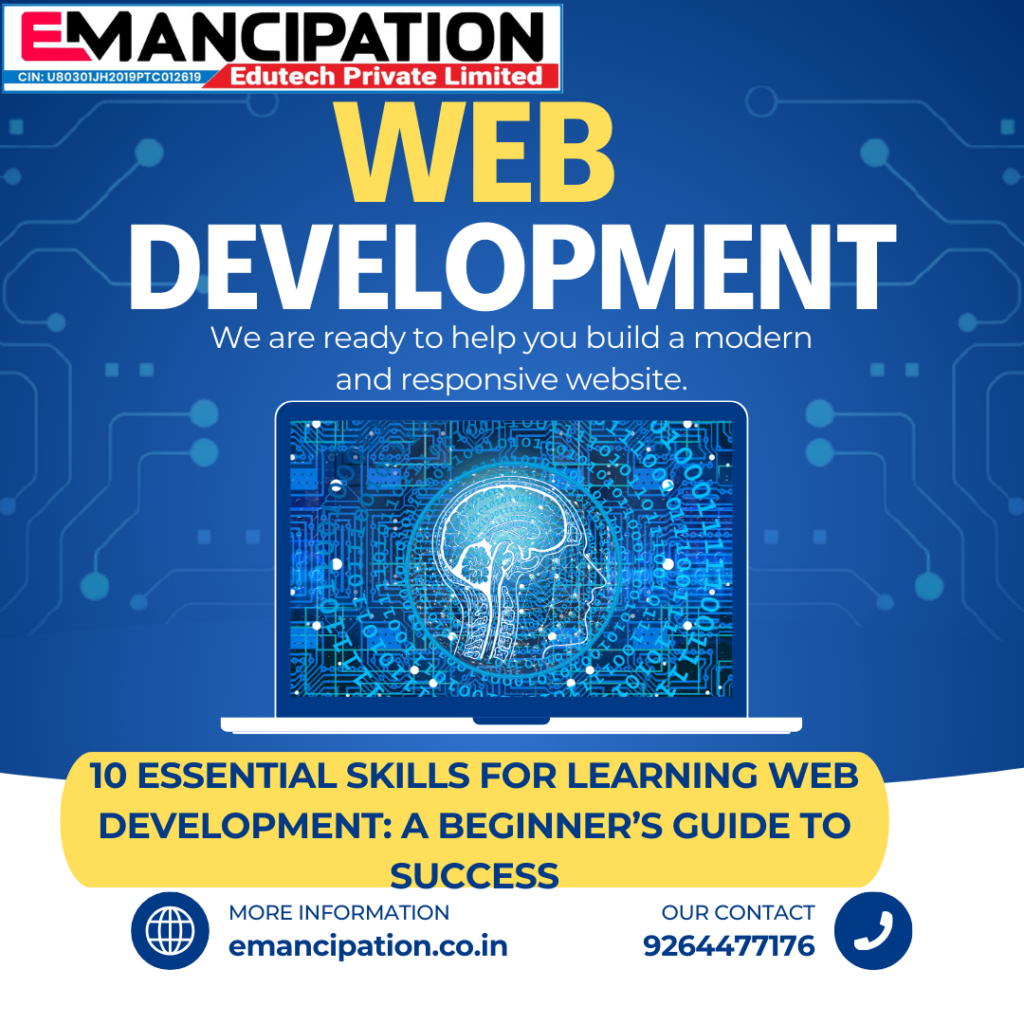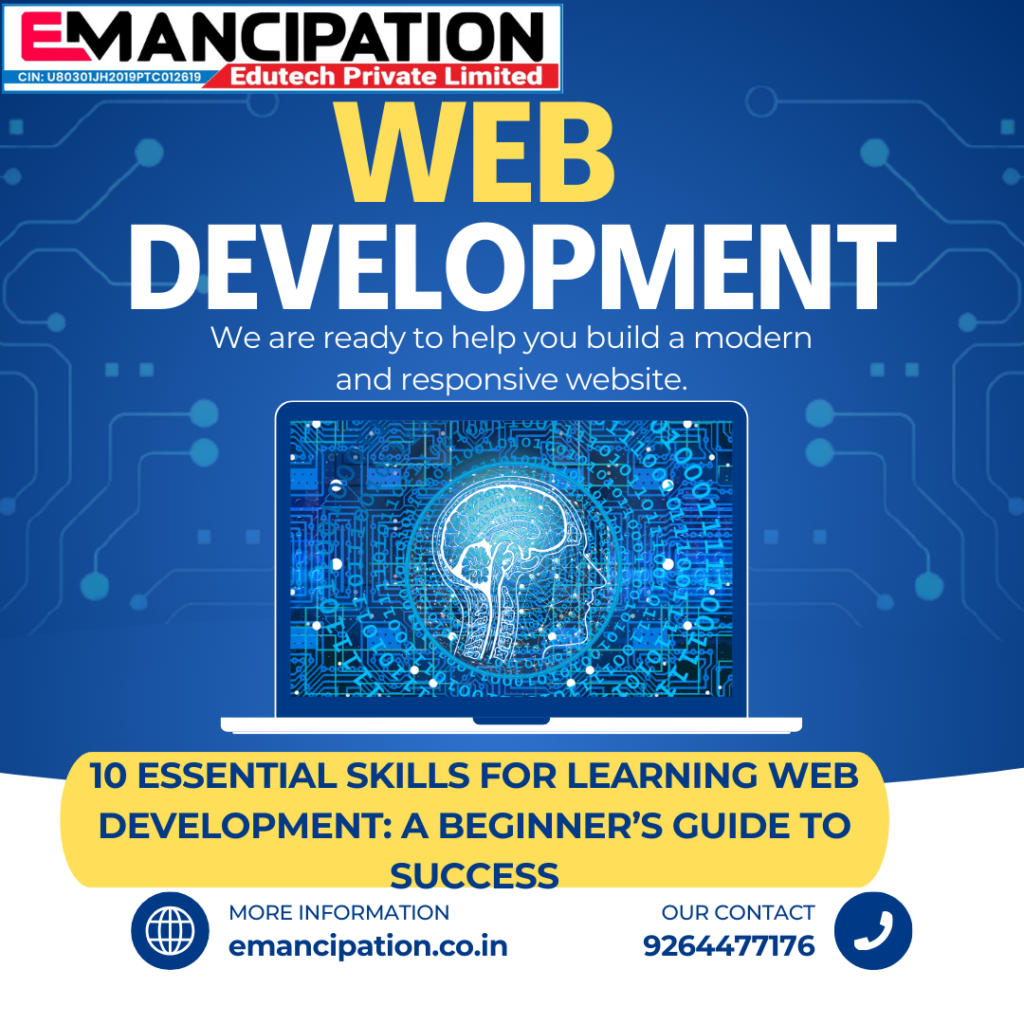Introduction
Web development skills requires the knowledge of both front-end skills and back-end skills which collectively known as full stack developer skills . These are common web development skills for beginners.

Web development is an ever-evolving field that powers the digital world, from simple blogs to complex web applications. Whether you’re looking to start a career in tech, build your own website, or become a versatile full-stack developer, learning the right skills is essential.
For beginners, understanding the distinction between front-end and back-end development is crucial. Front-end skills focus on the user interface and experience, involving technologies like HTML, CSS, and JavaScript to create visually appealing and responsive designs. On the other hand, back-end skills deal with server-side logic, database management, and application functionality using tools like Node.js, Python, or PHP.
Full-stack developers master both front-end and back-end development, making them capable of building complete, end-to-end web solutions. Whether you aim to specialize or adopt a full-stack approach, starting with foundational web development skills will set the stage for success in this dynamic industry.
Would you like to delve deeper into any specific aspect of web development?
web development skills, front-end skills, back-end skills, web development skills for beginners, full stack developers @https://www.emancipation.co.in
1. HTML and CSS: The Foundation of Web Development
HTML (HyperText Markup Language) structures web content, while CSS (Cascading Style Sheets) styles it. Together, they form the backbone of web development.
Key Focus Areas:
- Writing clean and semantic HTML code.
- Mastering CSS for responsive and visually appealing designs.
- Learning CSS frameworks like Bootstrap or Tailwind CSS for faster development.
2. JavaScript: Adding Interactivity to Websites
JavaScript is a core programming language that brings life to web pages by enabling interactivity.
Key Focus Areas:
- Understanding syntax and fundamental concepts (variables, functions, loops).
- Using JavaScript for DOM manipulation.
- Exploring ES6+ features like arrow functions and promises.
- Familiarity with frameworks/libraries like React, Angular, or Vue.js.
3. Version Control with Git
Version control is essential for collaboration and managing code changes. Git is the most widely used version control system.
Key Focus Areas:
- Learning Git commands (
git init,git commit,git push). - Understanding GitHub for project collaboration and portfolio building.
- Managing branches and resolving merge conflicts.
4. Responsive Design Principles
Websites must adapt to various screen sizes and devices for optimal user experiences.
Key Focus Areas:
- Using CSS media queries for responsive designs.
- Understanding fluid grids and flexible images.
- Testing designs on multiple devices.
5. Front-End Frameworks and Libraries
Frameworks and libraries streamline development processes and enhance productivity.
Key Focus Areas:
- Familiarizing yourself with React.js, Vue.js, or Angular for dynamic front-end development.
- Learning utility-first CSS frameworks like Tailwind CSS.
- Understanding the pros and cons of each framework/library.
6. Back-End Development Basics
Understanding the back-end is vital for creating complete web applications.
Key Focus Areas:
- Learning server-side languages like Node.js, Python, or PHP.
- Working with databases such as MySQL, PostgreSQL, or MongoDB.
- Understanding RESTful APIs and how they integrate with the front end.
7. Problem-Solving and Debugging Skills
Web development involves troubleshooting and optimizing code.
Key Focus Areas:
- Using browser developer tools for debugging.
- Understanding error messages and stack traces.
- Practicing algorithms and logical problem-solving.
8. Web Performance Optimization
Fast-loading websites improve user experience and SEO rankings.
Key Focus Areas:
- Optimizing images and using lazy loading.
- Reducing unnecessary HTTP requests.
- Implementing caching and compression techniques.
9. Search Engine Optimization (SEO) Basics
Web developers must ensure websites are optimized for search engines to drive traffic.
Key Focus Areas:
- Writing clean and accessible code.
- Using proper meta tags, alt attributes, and semantic HTML.
- Understanding site speed, mobile-friendliness, and structured data.
10. Continuous Learning and Adaptability
The tech landscape evolves rapidly, requiring web developers to stay updated.
Key Focus Areas:
- Following industry blogs, podcasts, and tutorials.
- Building projects to apply and refine your skills.
- Learning new tools, frameworks, and technologies as needed.
Conclusion
Becoming a successful web developer requires mastering both foundational and advanced skills. Start with the basics—HTML, CSS, and JavaScript—then expand your expertise into frameworks, back-end technologies, and optimization techniques. With persistence, practice, and a commitment to lifelong learning, you’ll thrive in the ever-evolving world of web development.
Meta Description:
Discover the 10 essential skills you need to master for a successful career in web development, from HTML and JavaScript to responsive design and SEO basics.
More Information and Updates, Connect With Us
• Name: Subir Chakraborty
• Phone Number: +91-9135005108
• Email ID: teamemancipation@gmail.com
• Our Platforms:
- Digilearn Cloud
- EEPL Test
- Live Emancipation
• Follow Us on Social Media: - Instagram – EEPL Classroom
- Facebook – EEPL Classroom
- https://www.instagram.com/teamemancipation/profilecard/?igsh=NG9sdGtuc3F1dm04
- https://www.facebook.com/teamemancipation
- Our Platform:
- BCA Classes in Ranchi Website Stay connected and keep learning with BCA Classes in Ranchi!
- Our Free Online Compiler: https://skaleup.emancipation.co.in/online-compiler/



